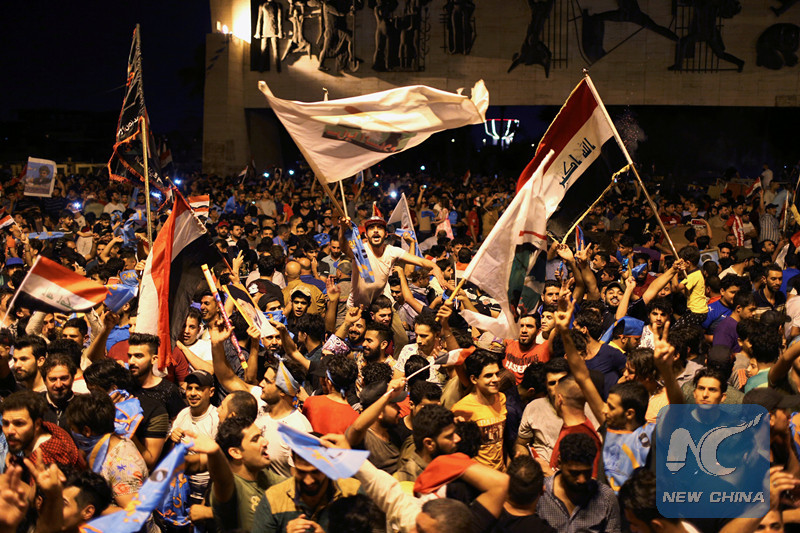
Iraqi supporters of Sairun list celebrate after results of Iraq's parliamentary election were announced in Baghdad, Iraq May 14, 2018. (REUTERS)
BAGHDAD, May 30 (Xinhua) -- The Iraqi Independent High Electoral Commission (IHEC) Wednesday said it has cancelled the ballots of 1,021 polling stations inside and outside Iraq after checking complaints over irregularities in the May 12 parliamentary election.
A statement by IHEC said that its technical and legal committees abolished votes of 954 polling stations inside Iraq, including 102 polling stations which were labelled "red" (serious complaints that affect results of polls), in the provinces of Erbil, Anbar, Baghdad-Karkh, Salahudin and Nineveh.
The 102 stations included votes from the early voting of security members, voting of refugee camps and some of the general polling stations, the statement said.
IHEC committees checked some 2,000 polling stations across the country, which are believed to have witnessed irregularities and forgery, but were not labelled red, and cancelled 852 of them in the provinces of Erbil, Anbar, Sulaimaniyah, Baghdad-Risafa, Baghdad-Karkh, Dohuk, Diyala, Salahudin, Nineveh and Kirkuk, according to the statement.
As for outside Iraq, the committees abolished the votes of 67 polling stations in the countries of Germany, Jordan, the United States, Sweden, Britain and Turkey, it said.
The electoral commission said "it is working diligently on all complaints and objections submitted by parties and candidates and continues to receive appeals and will not hesitate to address any violations and take legal action against the wrongdoers," it added.
On May 21, the commission cancelled the ballots of 103 polling stations in five of the Iraqi provinces after checking complaints over irregularities in May 12 parliamentary election.
The latest measure by the electoral commission came two days after the Iraqi parliament approved manual recounting of 10 percent of votes in the May 12 parliamentary election amid allegations of fraud, forgery and irregularities.
According to the parliament draft, if one quarter of the 10-percent votes are found with irregularity, the recounting would be carried out for all the votes across the country.
The parliament decision also demanded cancelling the votes of the polling centers outside Iraq if irregularities were found, as well as the results of the "conditional voting" in the refugee camps, according to a statement issued by the parliament.
The "conditional voters" refer to those who showed any IDs to prove their Iraqi citizenship instead of valid voting cards.
Many Iraqi parties, especially in the Kurdistan region and the disputed areas including Kirkuk province, have complained about irregularities and forgery in the parliamentary election.
The complaints put the electoral commission under pressure, as it has not carried out manual recounting of many ballot boxes and depended only on the electronic counting of the votes.
Earlier, Riyadh al-Badran, head of the electoral commission, told a press conference that "there is no justification for a manual recount yet," despite many complaints about voter fraud.
On May 17, UN Special Envoy to Iraq Jan Kubis issued a statement calling on the IHEC to carry out an immediate and thorough investigation into all complaints concerning the election.
The Iraqi parliament also called on May 19 for measures to instill confidence in the election process after receiving complaints from political entities about alleged irregularities.
On May 24, the Iraqi Council of Ministers (cabinet) met with top judicial and intelligence officials and the IHEC's security committee to discuss immunity of the electronic devices used in casting and counting the votes for the first time in the Iraqi election, a government statement said.
The cabinet appointed a special committee to investigate the allegations, whose results would be handed to the council of ministers, high judicial council and the federal court, according to the statement.
On May 12, Iraq held the first parliamentary election since defeating the Islamic State (IS) militant group in last December.

